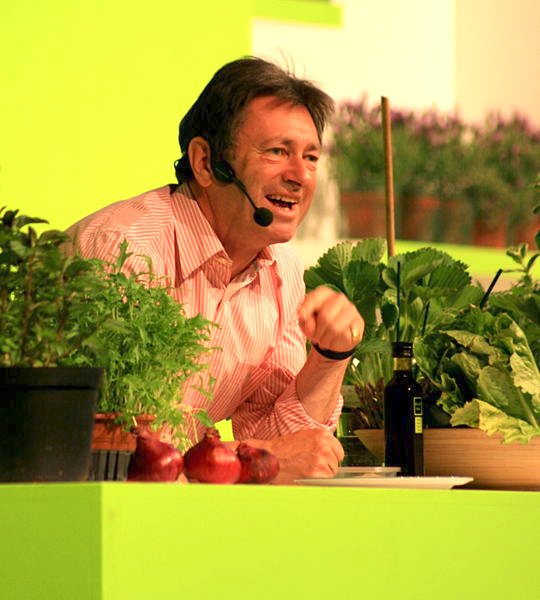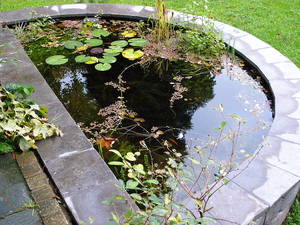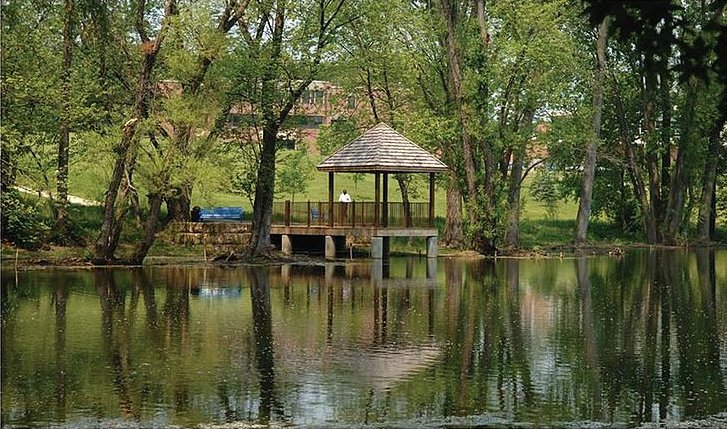The Million Pond Project
Interview with
Kat - Now over the recent decades ponds have vanished from our natural environment but the charity Pond Conservation is embarking on an ambitious project to see thousands of new ponds being created in the U.K. Have you noticed the quality of ponds changing over recent years?
 I went along to the launch of their Million Ponds Project to find out more and one special guest at the event was gardener and broadcaster Alan Titchmarsh. He is so lovely. So I started off by asking him why ponds are such an important part of our landscape.
I went along to the launch of their Million Ponds Project to find out more and one special guest at the event was gardener and broadcaster Alan Titchmarsh. He is so lovely. So I started off by asking him why ponds are such an important part of our landscape.
Alan - The greatest thing about ponds is that for something so relatively small the wildlife they support is absolutely huge. If you think of the things within the landscape that use a pond, from birds coming down to drink, hedgehogs and mammals coming down to drink. The pond life that's in the depths there and in the shallows from pond skaters and water boatmen to newts, frogs, toads, damsel flies, dragon flies, you start to build up this list and you think all that just for a little patch of clean water, and that's the vital thing and the answer is yes, and anybody can make one.
It is so simple - you can do it in an afternoon. Make a small pond, take charge of it; make it clean. You think 'Well, hang on a minute, how am I going to introduce all that wildlife to it?' You don't have to; it will come. The most astonishing thing is that all that wildlife finds you of it's own accord.
Kat - How would someone go about digging a pond? What would be your top tips for them?
Alan - Oh it's not just the quality of ponds it's the amount of ponds. We are losing numbers of ponds that are disappearing. I am lucky enough to live in a village which has a village pond, which is fed by natural stream. So it is wonderful. It stays clean. But they are disappearing. They get filled in and they get polluted, that's one of the most difficult things, we have run off from farmland and nitrates.
 Our clean ponds are now very few in number. I think it's about 80% of our ponds are no longer clean but it is not difficult to pull that right. I think that's the great appeal of Million Ponds is the fact that we can address this quite easily, relatively quickly and also quite economically.
Our clean ponds are now very few in number. I think it's about 80% of our ponds are no longer clean but it is not difficult to pull that right. I think that's the great appeal of Million Ponds is the fact that we can address this quite easily, relatively quickly and also quite economically.
Kat - How much fun can you have with ponds?
Alan - People tend to make ponds either too small and they heat up like saucepans on a hot summer's day or too deep, strangely enough. They think a pond is going to be about four feet... 18 inches in the middle is ample, go to two feet if you want, make sure it's got shallows so things can get in and get out and there's more life in the shallows of pond than there are in the depths.
If you have a 3-foot deep pond there's nothing much living right down the bottom there at all, one or two amphibians might hibernate there but most of them hibernate outside the pond, I mean under stones and things like that.
So it's so easy with a decent liner that can't get perforated and a bit of under lay, a bit of soil on top of it and then you can either fill it or you can be very patient, and wait for a rainy day. It's so easy, it's easy as that.
Kat - So ponds are easy to make and they are more fun than watching TV. To find out more about the Million Ponds Project I spoke to Jeremy Biggs, Policy & Research Director at Pond Conservation.
Alan - My big thing about ponds is exactly that and that to me is the essence of conservation. There tends to be a lot of finger wagging in conservation terms and the onus is on you and it's a weighty responsibility. It is the greatest joy in life to do something which improves that nasty thing called the environment. I am certain my life's work is to find a better word for environment. I like landscape, that's much nicer.
It is so joyous you introduce children to gardening too, and that's the sort of sharp end, if you like, of conservation, just dabbling around in the soil with a trowel making a pond, looking at pond life. They are entranced by it and that's far more and I say this as someone who knows, far more to watch in a pond than there's on telly.
Kat - So ponds are easy to make and they are more fun than watching TV. To find out more about the Million Ponds Project I spoke to Jeremy Biggs, Policy & Research Director at Pond Conservation.
Jeremy - Million Ponds Project is a five-year initiative to add about 4,000 new ponds to the countryside and in the longer term to double the number of ponds in the British landscape to get back to the million ponds or so that we had at the beginning of the 20th century.
So over the next 50 years we are going to make 500,000 new ponds to replace those old ones that we have lost.
 Kat - It sounds ambitious. Who is going to help you do this?
Kat - It sounds ambitious. Who is going to help you do this?
Jeremy - Well there are all sorts of people making ponds. It is actually not as ambitious as it sounds, I would say. When you look around the countryside it's about 20 ponds a day being made by people already. So that's five or 6,000 a year. So actually all we need to do really is just to capitalise on that work that they are already doing out there and make it a bit better and make them help people to get the best of the pond creation, of work they are already doing very often.
The people would be doing it, really again that's all kinds of people, from big organisations like the R.S.P.B., the National Trust, the Environment Agency, right through to the individual land owners and land managers. People can even make ponds at home in their garden as well.
Kat - And what are the risks of not bringing by the ponds? How we see the environment change as a result of losing so many ponds?
Jeremy - There are so many things that live in ponds, about two-thirds of all types of fresh water plants and animals there are can be found in ponds. So if you lose those ponds and in particular if when so many of them damaged by pollution and other impacts, so it's about 80% which are in poor condition. When so many are damaged and degraded, that means there's just less habitat available for a whole range of fresh water plants and animals, many of which have now become rare, most of the things which need clean water are struggling now-a-days. There's just nowhere left for them to go.
So by putting back that clean water we hope to take the pressure off a bit, let things spread out again, just to give them the refuge.
Kat - And finally tell me about your favourite pond?
Jeremy - Well I have got lots of favourite ponds, actually to be honest, almost any pond which is clean and unpolluted, has a rich stands of plants under the water. When you take a pond that you dip it, you see lots of different kinds of animals in the water. There are lots of amphibians around. These are not so common these days.
So almost anywhere where you see something like that, that's one of my favourite places. Of course you can see these dotted around the countryside still from the south of England, from the Lizard Peninsula, in the far south west, right through to the far North West highlands of Scotland. You can find them dotted around. To be honest, those are really all my favourites.










Comments
Add a comment